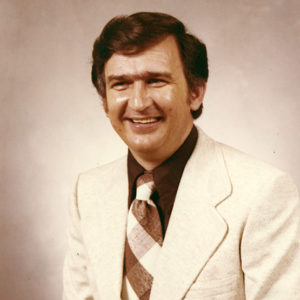calsfoundation@cals.org
Bob Scott (1933–)
Bob Scott is a lawyer, politician, and longtime Republican operative. He is best known for his work during Governor Winthrop Rockefeller’s administration as a legal advisor on the state’s prisons and as a finance manager. Despite being a Republican his entire adult life, Scott became an outspoken critic of what he came to see as his party’s extremism and abandonment of its core principles and historical legacy.
Bob Scott was born on October 6, 1933, in Gravette (Benton County) but grew up in Rogers (Benton County). He was the youngest of three sons born to Rogers native Kenneth Holmes Scott and Missouri native Jeffa June Beck Scott. In September 1940, Scott’s father died in a truck accident while working as a deliveryman for a baking company. To support the family after his father’s death, Scott’s mother went to work as a secretary for Claude Williams, a Republican lawyer in Rogers who was also active in the Church of Christ. Scott himself grew up in the Church of Christ, though he later left the denomination.
Scott did not graduate from high school. Instead, at the age of sixteen, he lied about his age so that he could join the National Guard. After a brief training period in North Little Rock (Pulaski County) at Camp Joseph T. Robinson, he was sent to Korea in January 1951, where he served in the 936th Field Artillery Battalion. Scott returned to the United States in 1952 after serving in the Korean War for just over a year. Scott continued to serve in the National Guard until 1960. In 1952, Scott met Annice Embrey; they married and had three daughters. The couple divorced in 1991.
Despite not having a high school diploma, Scott enrolled in the University of Arkansas School of Law. He graduated in 1958 and passed the bar exam that October. He began practicing in Rogers under the mentorship of lawyer Claude Duty, a prominent Republican.
Scott was raised in a “yellow dog” Democratic family, but, as a young man, he did not like Harry Truman and eventually joined the Republican camp. In 1962, Scott ran as a conservative Republican for a seat in the Arkansas General Assembly but did not win. He was, however, enjoying success as a lawyer, eventually becoming city attorney of Rogers.
In 1967, Scott joined Gov. Rockefeller’s administration as a legal advisor to the governor on the state’s prison affairs. For six months, Scott commuted from Rogers before moving to Little Rock (Pulaski County). Scott was an admirer of Rockefeller, whom he described as a hard-working official, as well as someone with an amazing memory and great capacity for empathy. However, he also characterized Rockefeller as having problems with alcohol.
Scott was at the center of the major controversies concerning Arkansas’s prisons. Scott thought of prison official Tom Murton as an intelligent and energetic reformer—a “revolutionary”—but also considered him a man who would not take responsibility for his mistakes. For example, on January 29, 1968, Murton, with national media on hand, uncovered three skeletons on the grounds near the Cummins unit prison facilities. Murton was convinced the corpses were those of murdered convicts and believed that many others were buried on the grounds. The Rockefeller administration eventually sponsored a report, based in part on forensic evidence, rejecting Murton’s allegations and arguing that the bodies came from a paupers’ cemetery located near the prison. Scott was the official who originally gave Murton permission to dig up bodies at Cummins, though Scott was not aware Murton had plans to involve the media.
In 1969, Scott was appointed by Rockefeller as commissioner of revenue. In this position, he became embroiled in controversies concerning gambling and administrative corruption. After the Rockefeller governorship ended, Scott returned to his law practice. He also stayed active in politics, serving as the chairman of the Pulaski County Republican Committee and general counsel to the Arkansas Republican Party.
Scott became a vocal critic of the Republican Party’s turn to the right from the 1990s onward. He called Kenneth Starr’s investigations into Arkansas politicians during the Whitewater investigations “abuse” and a “useless venture.” Scott supported George W. Bush but turned against him after the United States’ invasion of Iraq. Scott stated that he believed Bush lied to the American people in order to generate support for the war. He also lambasted what he called the “goose-stepping” and “Taliban” wing of the Republican Party, which he believes has violated core conservative principles. Remaining a supporter of Barry Goldwater–era principles of Republicanism, he also reevaluated his opinion of Harry Truman, whom he came to view as an “exceptional” president. As of 2019, Scott still lives in Rogers.
For additional information:
Dillard, Tom. “Bob Scott Interview.” David and Barbara Pryor Center for Oral and Visual History, University of Arkansas, Fayetteville. Online at http://pryorcenter.uark.edu/interview.php?thisProject=Arkansas%20Memories&thisProfileURL=SCOTT-Bob&displayName=Bob%20Scott&thisInterviewee=516 (accessed September 13, 2019).
Smith, Doug. “Yesterday’s Republicans Look at Today’s,” Arkansas Times, January 18, 2011. Online at https://arktimes.com/news/cover-stories/2011/01/18/yesterdays-republicans-look-at-todays-2 (accessed September 13, 2019).
Ward, John. The Arkansas Rockefeller. Baton Rouge: Louisiana State University Press, 1978.
Colin Edward Woodward
Hampden-Sydney College
 Divergent Prosperity and the Arc of Reform, 1968–2022
Divergent Prosperity and the Arc of Reform, 1968–2022 Law
Law Politics and Government
Politics and Government Bob Scott
Bob Scott 




Comments
No comments on this entry yet.